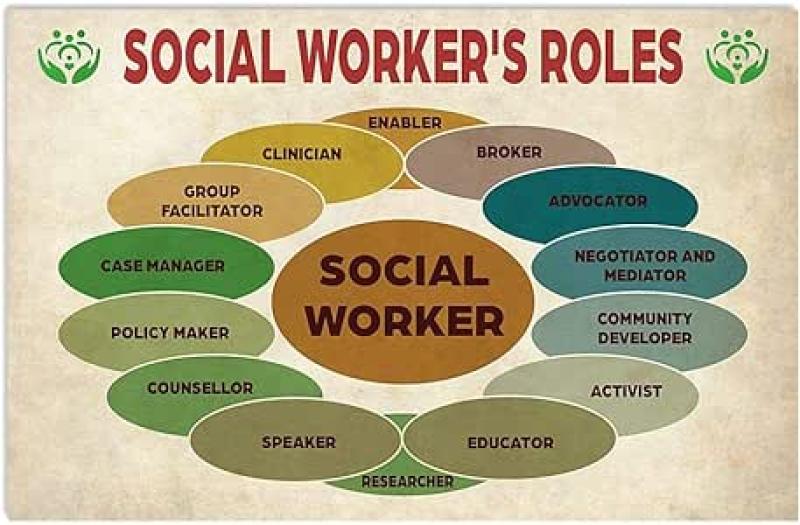What are the different roles of social workers?
Social workers play diverse and crucial roles in various settings to support individuals, families, and communities. Their responsibilities can vary depending on their specialization and the context in which they work. Here are some of the varied roles of social workers:
Clinical Social Worker:
- Provide psychotherapy and counseling services to individuals, families, and groups.
- Diagnose and treat mental health conditions.
- Address emotional, behavioral, and interpersonal challenges.
Medical Social Worker:
- Work in healthcare settings to provide support to patients and their families.
- Assist with coping strategies related to medical diagnoses and treatment plans.
- Coordinate resources and services to enhance the overall well-being of patients.
School Social Worker:
- Work in educational settings to support students' academic and social-emotional development.
- Address behavioral issues, bullying, and family concerns that may affect a student's performance.
- Collaborate with teachers, parents, and administrators to create a positive learning environment.
Child Welfare Social Worker:
- Work with children and families involved in the child welfare system.
- Investigate reports of child abuse or neglect.
- Provide support, counseling, and resources to families to ensure child safety and well-being.
Geriatric Social Worker:
- Focus on the needs of elderly individuals and their families.
- Provide assistance with healthcare decisions, housing, and long-term care planning.
- Address issues related to aging, such as isolation and caregiver support.
Hospice and Palliative Care Social Worker:
- Provide emotional support and counseling to individuals and families facing serious illness.
- Assist with end-of-life decision-making and planning.
- Coordinate resources for pain management and comfort care.
Crisis Intervention Social Worker:
- Respond to crises and emergencies, such as natural disasters or community tragedies.
- Provide immediate support and counseling to individuals affected by trauma.
- Collaborate with other emergency response professionals.
Substance Abuse Counselor:
- Work with individuals struggling with substance use disorders.
- Provide counseling, support, and resources for addiction treatment and recovery.
- Collaborate with treatment teams to develop comprehensive plans.
Advocacy and Policy Social Worker:
- Advocate for social justice and policy changes to address systemic issues.
- Engage in legislative advocacy to improve social welfare.
- Work with organizations focused on policy development and change.
Military Social Worker:
- Support military service members, veterans, and their families.
- Address issues related to deployment, PTSD, and reintegration into civilian life.
- Provide counseling and resources for mental health and well-being.
These roles highlight the diverse settings and populations that social workers serve. Social workers are trained to address a wide range of social issues and contribute to positive change in individuals and communities.
Social workers play a pivotal role in society, addressing the needs of individuals, families, and communities. They work in a wide range of settings, including hospitals, schools, mental health clinics, government agencies, and private practice. Their diverse responsibilities encompass various aspects of social well-being, advocacy, and support services.
Key Roles and Contributions of Social Workers
Assessment and Evaluation: Social workers conduct comprehensive assessments to gather information about clients' needs, situations, and challenges. They analyze this information to develop individualized plans to address clients' needs and improve their overall well-being.
Counseling and Therapy: Social workers provide counseling and therapy to individuals, families, and groups. They help their clients develop coping mechanisms, manage mental health issues, and improve their emotional well-being. They often employ various therapeutic approaches, including cognitive behavioral therapy (CBT), interpersonal therapy (IPT), and family therapy.
Case Management: Social workers coordinate care for their clients, making referrals to other services, advocating for their clients' needs, and ensuring they receive comprehensive support and resources. They collaborate with healthcare providers, educators, legal professionals, and social service agencies to navigate complex systems and advocate for the best interests of their clients.
Advocacy: Social workers champion the rights and interests of their clients, often those marginalized or vulnerable. They work to change policies, raise awareness about social issues, and challenge injustices that impact individuals and communities. They may advocate for access to healthcare, education, housing, employment, and other essential services.
Community Development: Social workers contribute to improving the well-being of communities by developing and implementing programs and services that address community needs. They engage with local residents, identify areas of concern, and collaborate with organizations to create positive change. They may work on initiatives related to poverty reduction, education, healthcare, criminal justice reform, and environmental sustainability.
Diverse Responsibilities and Specializations
Social workers' responsibilities vary depending on their specialization and work setting. Some common specializations include:
Child and Family Social Workers: Protect vulnerable children and families, intervene in cases of abuse or neglect, and provide support for family reunification and foster care.
School Social Workers: Provide counseling and support to students facing academic, social, or emotional challenges, collaborate with teachers and parents, and promote school safety and anti-bullying initiatives.
Medical Social Workers: Assist patients and their families in navigating healthcare systems, addressing psychosocial issues related to illness, and facilitating discharge planning.
Mental Health Social Workers: Provide counseling and therapy for individuals with mental health disorders, conduct assessments, and manage treatment plans.
Gerontological Social Workers: Work with older adults to address their specific needs, provide support for aging in place, and advocate for their rights and well-being.
Social workers play a multifaceted and essential role in society, promoting social justice, empowering individuals and communities, and improving the lives of those they serve. Their work contributes to a more equitable, compassionate, and healthy society.













